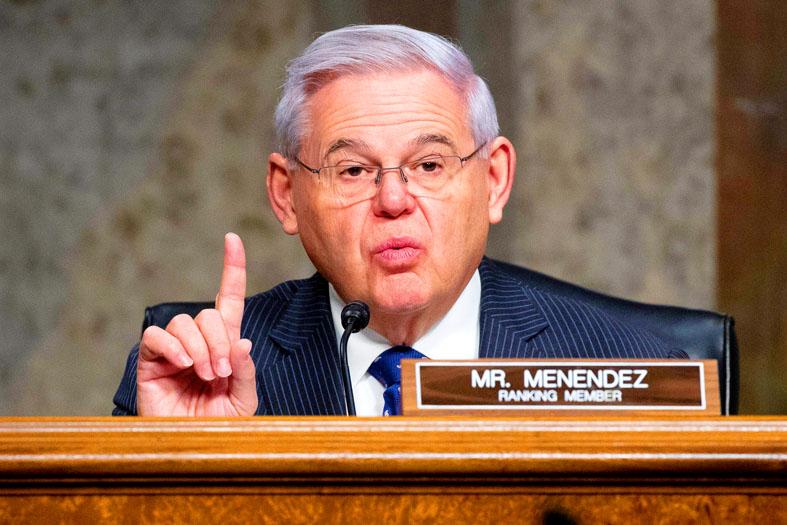The US Senate on Thursday passed a bill urging the US Department of State to develop a strategy to help Taiwan regain observer status at the WHO.
Introduced by US Senator Bob Menendez in March, the bill was approved by unanimous consent on the Senate floor, after it was approved by voice vote in the Senate Committee on Foreign Relations on Wednesday last week.
The bill described Taiwan as a model contributor to world health, saying that it has contributed more than US$6 billion to international medical and humanitarian aid efforts in more than 80 countries since 1996.

Photo: Reuters
Taiwan donated millions of personal protective equipment items and COVID-19 tests to countries in need last year, it added.
“Diseases know no borders, and Taiwan’s needless exclusion from global health cooperation increases the dangers presented by global pandemics,” the bill said, citing Taiwan’s efforts to participate as an observer in WHO events since 1997.
With support from the US and like-minded countries, Taiwan held that status from 2009 to 2017, the bill said.
However, Taiwan has not been invited to participate in WHO events after the administration of President Tsai Ing-wen (蔡英文) began facing increased resistance from Beijing on the international stage, it said.
If signed into law, the bill would direct US Secretary of State Antony Blinken to draft a strategy to include Taiwan in the World Health Assembly, the WHO’s highest decisionmaking body.
It would also require the secretary of state to report annually to the US Congress on the efforts.
The US House of Representatives passed a similar bill in March, and both chambers of Congress would have to agree on a unified version of the legislation before it could be signed into law by US President Joe Biden.
Bills on the inclusion of Taiwan in the WHO have been proposed to both chambers since 2017, without passing a vote until early this year.

AIR SUPPORT: The Ministry of National Defense thanked the US for the delivery, adding that it was an indicator of the White House’s commitment to the Taiwan Relations Act Deputy Minister of National Defense Po Horng-huei (柏鴻輝) and Representative to the US Alexander Yui on Friday attended a delivery ceremony for the first of Taiwan’s long-awaited 66 F-16C/D Block 70 jets at a Lockheed Martin Corp factory in Greenville, South Carolina. “We are so proud to be the global home of the F-16 and to support Taiwan’s air defense capabilities,” US Representative William Timmons wrote on X, alongside a photograph of Taiwanese and US officials at the event. The F-16C/D Block 70 jets Taiwan ordered have the same capabilities as aircraft that had been upgraded to F-16Vs. The batch of Lockheed Martin

GRIDLOCK: The National Fire Agency’s Special Search and Rescue team is on standby to travel to the countries to help out with the rescue effort A powerful earthquake rocked Myanmar and neighboring Thailand yesterday, killing at least three people in Bangkok and burying dozens when a high-rise building under construction collapsed. Footage shared on social media from Myanmar’s second-largest city showed widespread destruction, raising fears that many were trapped under the rubble or killed. The magnitude 7.7 earthquake, with an epicenter near Mandalay in Myanmar, struck at midday and was followed by a strong magnitude 6.4 aftershock. The extent of death, injury and destruction — especially in Myanmar, which is embroiled in a civil war and where information is tightly controlled at the best of times —

Taiwan was ranked the fourth-safest country in the world with a score of 82.9, trailing only Andorra, the United Arab Emirates and Qatar in Numbeo’s Safety Index by Country report. Taiwan’s score improved by 0.1 points compared with last year’s mid-year report, which had Taiwan fourth with a score of 82.8. However, both scores were lower than in last year’s first review, when Taiwan scored 83.3, and are a long way from when Taiwan was named the second-safest country in the world in 2021, scoring 84.8. Taiwan ranked higher than Singapore in ninth with a score of 77.4 and Japan in 10th with

China's military today said it began joint army, navy and rocket force exercises around Taiwan to "serve as a stern warning and powerful deterrent against Taiwanese independence," calling President William Lai (賴清德) a "parasite." The exercises come after Lai called Beijing a "foreign hostile force" last month. More than 10 Chinese military ships approached close to Taiwan's 24 nautical mile (44.4km) contiguous zone this morning and Taiwan sent its own warships to respond, two senior Taiwanese officials said. Taiwan has not yet detected any live fire by the Chinese military so far, one of the officials said. The drills took place after US Secretary